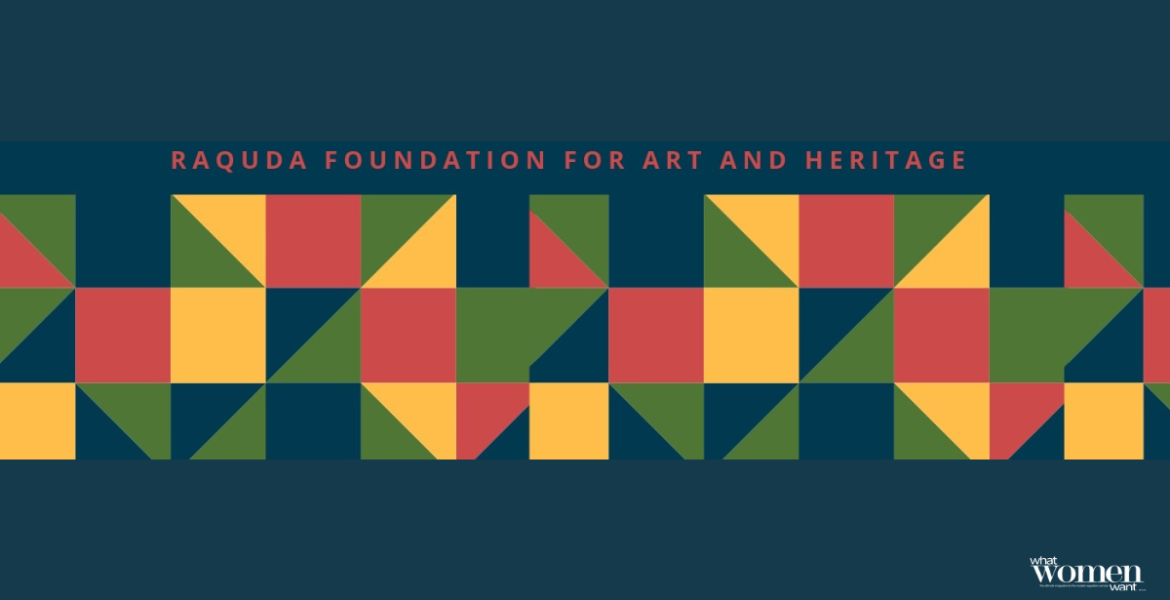Conserving one’s heritage is a noble, and quite essential, goal. Rawda Abdelhady founded Raquda Foundation for Art and Heritage (NGO – NPO) in Alexandria for that very noble and essential goal. She graduated from Faculty of Art, Egyptology Department. Then the Faculty of Archaeology, Conservation and Restoration Department. And finally, she received an MA in Heritage Conservation and Site Management. She began founding Raquda in 2015 to be the first NGO in Alexandria working on heritage management, development and conservation. Raquda’s projects are divided into two main categories: heritage and art, by academic and public implementation. We speak to the Founding Director of Raquda to learn all about its work.
 Raquda’s services range from hosting galleries, workshops and exhibitions, to providing a coworking space and even selling the products resulting from the workshops you host. How do you maintain such a diverse portfolio of services?
Raquda’s services range from hosting galleries, workshops and exhibitions, to providing a coworking space and even selling the products resulting from the workshops you host. How do you maintain such a diverse portfolio of services?
Heritage consists of two types; the tangible and the intangible. The tangible is the sites, collections, temples, palaces, and so on. The intangible is related to traditions, clothes, accessories, habits, literature… etc. So, the intangible heritage needs to be preserved and marketed like the tangible heritage. Raquda ensures heritage branding by organizing galleries of heritage products, plus providing shop corners for selling handmade products by many artists. Currently; Raquda started a project in cooperation with the Ministry of Youth and Sports titled “Al-Herafi Project”. This project aims to teach the public heritage handcrafts, then sell them with local and global channels. The main goal of supporting the industry of heritage handcrafts is providing an economic source for the families and the country, in addition to enhancing the image of Egypt internationally.
 Volunteering is an important part of Raquda’s work. Please tell us more about it.
Volunteering is an important part of Raquda’s work. Please tell us more about it.
Raquda is an NGO and non-profit; the manpower is the basis of any organization’s success, and that’s why until now, Raquda works with more than 350 volunteers and 85% of them are young people.
I am sure that the main reason behind Raquda’s uniqueness and project success is its work with volunteers. The most creative ideas we worked on were designed and implemented by them.
And when I see anyone of those working with us starting a new job or degree in heritage, after recognizing the importance of heritage management and development through Raquda, I feel this is the most important achievement.
In your opinion, are heritage preservation foundations receiving enough attention and care from the community and government? If not, what needs to be done to change that?
In Egypt we only have three foundations working on heritage preservation and conservation, two of them play effective roles in raising awareness and increasing heritage value. This influences the community in various aspects; social, economic, educational and spiritual.
There is a philosophy for preservation and conservation and when the conservator learns it, they must share it with the community.
This will help more in preventive conservation, which seeks to stop any new damage, so there wouldn’t be the need to restore or recover our heritage. This will be achieved by raising awareness and involving the whole community in heritage-related work and education.
Alexandrian heritage is so unique, and not all Egyptians know enough about what makes it so special. How has Raquda changed that in your opinion?
Alexandria’s difference comes from it being a cosmopolitan city where different communities lived, and they were the ones who founded it and its multi-culture too. So, Raquda’s Alexandria Heritage projects are divided into two categories: public heritage awareness, to let the people recognize Alexandrian heritage and its roots; and the documentation projects which are related to heritage interpretation and communication. For instance; in El-Mawled celebrations, we organize cultural parties which include Alexandrian customs such as offering special foods and drinks, and hosting traditional religious Sufi singers. Through those parties, the audiences learn about Alexandrian heritage by practicing it directly.
What parts of Alexandrian heritage are you most excited to bring to the spotlight?
First, the underwater cultural heritage of Alexandria, because it contains the most significant parts of the old city, which is hidden now. The second one is the traditions and habits, because they contain a lot of peaceful meanings.
What are your future plans for Raquda?
We are working on four projects which we hope to finish through 2020\2021. Those projects focus on using technology, heritage development, heritage business and heritage entrepreneurship. Through those projects, we hope to attract new workers and volunteers, and start new international collaboration with Mediterranean and Arab countries too.


 Raquda’s services range from hosting galleries, workshops and exhibitions, to providing a coworking space and even selling the products resulting from the workshops you host. How do you maintain such a diverse portfolio of services?
Raquda’s services range from hosting galleries, workshops and exhibitions, to providing a coworking space and even selling the products resulting from the workshops you host. How do you maintain such a diverse portfolio of services? Volunteering is an important part of Raquda’s work. Please tell us more about it.
Volunteering is an important part of Raquda’s work. Please tell us more about it.